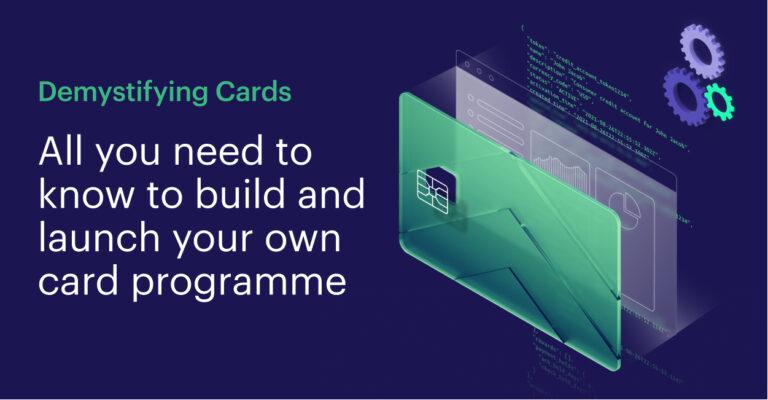While fintech and banking innovators strive to deliver seamless, frictionless experiences to end users, the actual process of building a modern payment interface is often anything but simple. Behind the scenes of everyday transactions lies a complex web of enablers working in sync to make purchases and transfers happen quickly and, dare we say it, beautifully.
Making sense of this complexity is no easy task, whether you’re a yet-to-launch start-up or are several products into your journey.
This is precisely why Marqeta developed Demystifying Cards – an open source repository of information designed to help payment innovators innovate.
As part of this unique education initiative, we recently staged the livestream Demystifying Cards – How modern card products are transforming payment experiences, the first instalment of a series that will explore different aspects of modern card programme development.
Featuring Jas Shah, Founder of Bitsul consultancy, Visa’s Vice President, Head of Processor Partnerships Joe Samuel, and Sandra Mianda, CEO and Founder of Papyr.work consultancy, the panel discussion was expertly guided by Olivia Minnock, Senior Partnerships Manager at embedded finance provider mmob.
How industry experts learn about the payments landscape
In opening, the panellists explored their different approaches to learning about the cards space, weighing up the merits of consuming industry content such as blogs, podcasts and news versus formal qualifications.
And while Sandra felt it was essential to incorporate learning into the working week, the key for Jas was having access to visual and written explanations of payments’ many complex concepts.
He also explained how the sector’s breadth and depth could make it seem challenging to understand: “There aren’t really that many barriers to learning, because if you’re technically minded you can read all the APIs and understand quite easily how payment rules work.
“But the reason payments are so complex is because it’s a really broad subject. For example, with the different payment rails you’ve got SWIFT, CHAPS, account-to-account, SEPA, debit and credit cards, and that’s just the UK.
“Then you’ve got the depth, which is about understanding the landscape to regulatory and technical extents, or understanding its economic and consumer benefits.”
On top of this, Sandra added that learnings about processes may not always be relevant when applied to different industries.
“You might learn something that is pertinent to a particular segment, but when you transfer this, for example, from retail to (the) airline (sector), the dynamics and value drivers are completely different. And then alongside this you need to consider the impact of fast-paced evolution, which could be driven by regulation or consumer led,” she explained.
Joe echoed these thoughts, summarising that it was “impossible to get bored working in payments, as one can never know it all”.
“Visa is great about curiosity. We have lots of different vehicles to continue our learning. The payments industry is so broad and so deep, I don’t think anyone can ever understand every aspect – for example there’s card payments, non-card rails, retail payments, corporate payments, just general business payments – it’s endless,” he said.
A culture of mutual support makes payments a nurturing place to work
While many businesses admirably take a proactive approach to building knowledge among teams, members of the payments community are highly “reciprocal” when it comes to sharing information and providing advice via LinkedIn and other channels.
In Jas’ experience, if you help someone out today, there’s a good chance they’ll come to your assistance two years down the line. Which is very much what Demystifying Cards is about. If you or one of your contacts doesn’t know the answer to a question, it’s likely that Marqeta’s new information repository does.
On the flipside of people’s willingness to help, the sector’s technical complexity and culture of reciprocity make it both easier – and essential – to be inquisitive.
Sandra reinforced this point when describing the product build process: “You shouldn’t be afraid (to ask a question) because you’re coming from a product standpoint or a commercial standpoint – you’re actually coming from an equal standpoint. It’s important to realise that and you’d be surprised how many people will be glad you asked a question.”
How to build payments-literate society
In addition to intra-industry education, the panel also considered the challenge of growing a consumer base fully informed about how card payments work. Unsurprisingly, there was agreement that this process needed to begin at an early age.
Joe picks up the point: “The responsibility, I believe, starts with parents but other institutions should have a vested interest. So whether it’s schools, nonprofits, financial institutions, I think having better educated consumers around finances is best for all – I don’t believe it’s the job of one particular entity.”
While in broad agreement about starting early, Jas came at this question from an institutional angle: “I would say that it starts with schools, because not not everyone is necessarily going to have a specific app where they can learn. It has to start at the base level and it has to be driven by the (school) syllabus, and then we can talk about financial savings apps.”
However, educating the masses is no easy task. With payments innovation running at such a fast pace, it’s a certainty that what we learn today will be outdated in 10 years’ time.
Sure, the fundamental concepts of deficit and surplus in a financial context are unlikely to change, but learning about new products and approaches to credit will be an ongoing process.
Thankfully, our LinkedIn networks and colleagues will continue to prove invaluable in helping us stay across the latest trends and knowledge. But it’s also good to know that Marqeta’s ever-evolving Demystifying Cards project will be available too.
View the recording here.

